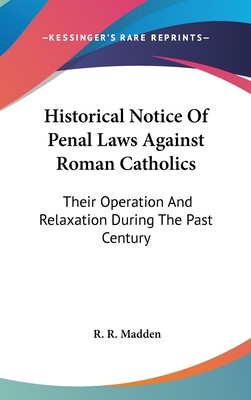
- We will send in 10–14 business days.
- Author: R R Madden
- Publisher: Kessinger Publishing
- ISBN-10: 0548204241
- ISBN-13: 9780548204245
- Format: 15.2 x 22.9 x 1.8 cm, kieti viršeliai
- Language: English
- SAVE -10% with code: EXTRA
Historical Notice Of Penal Laws Against Roman Catholics (e-book) (used book) | bookbook.eu
Reviews
Description
Originally published in 1847, hence in the public domain, this book contains an authentic account of the Penal Laws with which England was afflicted, and through which English Catholics suffered a martyrdom of centuries.
This kindle edition is fully edited with linked footnotes.
As subtitled by its author, the book details: “The operation and results of that system of legalized plunder, persecution, and proscription; originating in rapacity and fraudulent designs, concealed under false pretences, figments of reform, and a simulated zeal for the interests of true religion.”
The author, Richard R. Madden (1798-1886), a Dublin doctor, lawyer, and Catholic, served as a special magistrate in the Caribbean where he monitored the implementation of Britain’s 1833 legislation abolishing slavery. Uncompromising on slavery and oppression, at times his opponents accused the ‘bookish’ Madden of being a fanatic. His fiercely independent approach caused one colonial official to remark that ‘he could not be bribed, cajoled, or coerced’.
According to the author, the great difference between the sixteenth century in England, and the nineteenth century in Spain and Portugal, is “the pretence.” In both the object was the same, —the spoliation of God's Church and of God's poor, for the enrichment of the avaricious, the base, and the vile. In the sixteenth century the holy name of "the Gospel" was used to sanctify robbery; in the nineteenth century the venerable name of "liberty" was misemployed as a subterfuge for plunder. The goods of the Church, and the estates of the poor, were alike craved after by infidels in religion and tyrants in politics.
Madden’s watchword was freedom, of which his battles against the subjugation of Irish Catholics and the enslavement of Africans were two important elements.
He died at his home in Booterstown, just south of Dublin city, in 1886 and is interred in Donnybrook Cemetery.
EXTRA 10 % discount with code: EXTRA
The promotion ends in 23d.17:35:03
The discount code is valid when purchasing from 10 €. Discounts do not stack.
- Author: R R Madden
- Publisher: Kessinger Publishing
- ISBN-10: 0548204241
- ISBN-13: 9780548204245
- Format: 15.2 x 22.9 x 1.8 cm, kieti viršeliai
- Language: English English
Originally published in 1847, hence in the public domain, this book contains an authentic account of the Penal Laws with which England was afflicted, and through which English Catholics suffered a martyrdom of centuries.
This kindle edition is fully edited with linked footnotes.
As subtitled by its author, the book details: “The operation and results of that system of legalized plunder, persecution, and proscription; originating in rapacity and fraudulent designs, concealed under false pretences, figments of reform, and a simulated zeal for the interests of true religion.”
The author, Richard R. Madden (1798-1886), a Dublin doctor, lawyer, and Catholic, served as a special magistrate in the Caribbean where he monitored the implementation of Britain’s 1833 legislation abolishing slavery. Uncompromising on slavery and oppression, at times his opponents accused the ‘bookish’ Madden of being a fanatic. His fiercely independent approach caused one colonial official to remark that ‘he could not be bribed, cajoled, or coerced’.
According to the author, the great difference between the sixteenth century in England, and the nineteenth century in Spain and Portugal, is “the pretence.” In both the object was the same, —the spoliation of God's Church and of God's poor, for the enrichment of the avaricious, the base, and the vile. In the sixteenth century the holy name of "the Gospel" was used to sanctify robbery; in the nineteenth century the venerable name of "liberty" was misemployed as a subterfuge for plunder. The goods of the Church, and the estates of the poor, were alike craved after by infidels in religion and tyrants in politics.
Madden’s watchword was freedom, of which his battles against the subjugation of Irish Catholics and the enslavement of Africans were two important elements.
He died at his home in Booterstown, just south of Dublin city, in 1886 and is interred in Donnybrook Cemetery.


Reviews